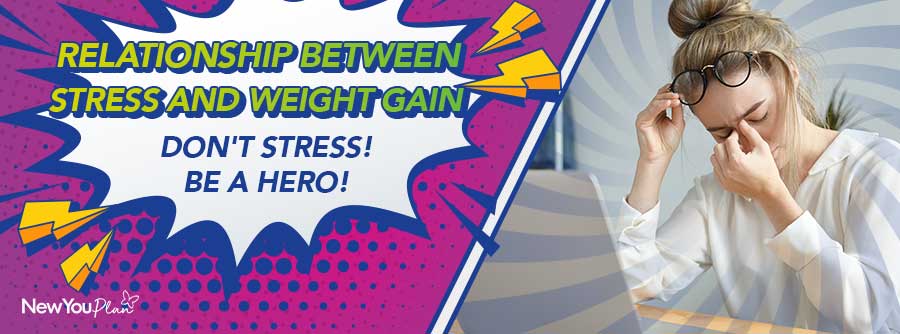
Don’t Stress – Be a Hero!
Relationship between stress and weight gain – Be a hero and don’t stress!
During the first COVID-19 lockdown there was an increase in behaviours related to weight gain (1). The significant behaviours linked to this were frequent intake of ultra-processed food, snacking, being less active having less portion control, higher reported levels of stress and emotional eating (2,3).
Stress and weight gain
Stress has long been associated with weight, interestingly both weight loss and weight gain. There is data to show that both chronic stress and long term cortisol levels are associated with an increased risk of obesity in both childhood (4) and adults (5). There are several mechanisms by which stress and the stress hormone cortisol may be related to weight gain.
As the body perceives stress, cortisol is released into the bloodstream which is part of the body’s natural fight or flight response. The release of cortisol has been associated with increased intake of ‘comport’ type foods which are typically higher in fat and/or sugar (6) as well as an increase in appetite. At one point this may have served as an evolutionary mechanism to keep us alive, a life threatening stressor would lead to intake of life preserving food or moving to a place where it was safe and food was available. In our current food abundant environment however this action is not so beneficial.
Alongside this, eating highly palatable foods also appears to decrease the feeling of stress by activating the reward centres in the brain, this may play a role in reinforcing subsequent eating of pleasurable foods when stressful emotions are felt as we know it will make us feel better (7).
On the other hand, actually being of a higher weight can lead to increased chronic stress, for example people experiencing weight stigma are known to experience more stress (8). There are also other problems associated with increased weight, such as chronic pain and the likelihood to suffer with mental health issues such as depression, that culminate in higher stress levels.
Unfortunately in some cases a vicious circle may be formed that maintains a cycle of chronic stress and increased weight.
Stress is related to sleep quality, higher levels of stress can lead to disruptions in sleep which can in turn lead to lower levels of physical activity resulting in weight gain (9).
On the other hand, it is also observed that a stressful event or higher levels of anxiety can lead to unintentional weight loss, this may be due effects on hormones leading to changes in appetite, metabolism and physical activity.
Although we do have some insight into the association between stress and weight gain more research is required to fully understand the relationship.

How to reduce stress?
Modern day life, and in particular life during a pandemic, can bring with it many stresses. Having ways to manage stress and anxiety can be very important for aiding weight loss and keep it off long term. Relieving stress can also promote overall well being which in itself is important for weight management (10).
- Mild to moderate exercise can reduce the levels of cortisol and adrenaline the stress hormones (11). As well as reducing symptoms of stress and anxiety which could in itself help with weight management, combining exercise with dietary changes can improve weight loss and weight maintenance outcomes. Be mindful not to overdo it, as vigorous maximal effort exercise can actually increase cortisol levels. Partake in exercise you find enjoyable even if it is just going for a 10 minute walk to clear your head.
- Practicing mindfulness and mindful eating has been shown to reduce levels of stress, anxiety and depression as well as promote a positive relationship with food which can aid with weight management (12,13).
- Journaling can be a form of stress management, it can help you become more self-aware and process your thoughts. Through journaling it is possible to become more aware of how your emotions are linked to your food choices.
- While managing stress can help to improve sleep, having strategies in place to help you get a more restful night’s sleep can help the effect of stress induced sleepless nights. For example have a plan for what to do if you can’t sleep e.g., meditation or reading a book,
Although there are many ways to reduce stress, finding a way or ways that work for you and your lifestyle is the most important.
References
- Bhutani S, Vandellen MR, Cooper JA. Longitudinal weight gain and related risk behaviors during the covid-19 pandemic in adults in the us. Nutrients [Internet]. 2021 Feb 1 [cited 2021 Mar 16];13(2):1–14. Available from: https://pubmed.ncbi.nlm.nih.gov/33669622/
- Aghili SMM, Ebrahimpur M, Arjmand B, Shadman Z, Pejman Sani M, Qorbani M, et al. Obesity in COVID-19 era, implications for mechanisms, comorbidities, and prognosis: a review and meta-analysis. Int J Obes (Lond) [Internet]. 2021 Feb 26 [cited 2021 Mar 16]; Available from: http://www.ncbi.nlm.nih.gov/pubmed/33637951
- Wang SD, Devjani S, Chillakanti M, Dunton GF, Mason TB. The COMET Study: Examining the Effects of COVID-19-Related Perceived Stress on Los Angeles Mothers’ Dysregulated Eating Behaviors, Child Feeding Practices, and Body Mass Index. Appetite [Internet]. 2021 Mar 15 [cited 2021 Mar 25];105209. Available from: http://www.ncbi.nlm.nih.gov/pubmed/33737212
- Noppe G, Van Den Akker ELT, De Rijke YB, Koper JW, Jaddoe VW, Van Rossum EFC. Long-term glucocorticoid concentrations as a risk factor for childhood obesity and adverse body-fat distribution. Int J Obes [Internet]. 2016 Oct 1 [cited 2021 Mar 16];40(10):1503–9. Available from: https://pubmed.ncbi.nlm.nih.gov/27339603/
- van der Valk ES, Savas M, van Rossum EFC. Stress and Obesity: Are There More Susceptible Individuals? [Internet]. Vol. 7, Current obesity reports. Springer; 2018 [cited 2021 Mar 16]. p. 193–203. Available from: /pmc/articles/PMC5958156/
- Dallman MF. Stress-induced obesity and the emotional nervous system [Internet]. Vol. 21, Trends in Endocrinology and Metabolism. Trends Endocrinol Metab; 2010 [cited 2021 Mar 16]. p. 159–65. Available from: https://pubmed.ncbi.nlm.nih.gov/19926299/
- Pecoraro N, Reyes F, Gomez F, Bhargava A, Dallman MF. Chronic stress promotes palatable feeding, which reduces signs of stress: Feedforward and feedback effects of chronic stress. Endocrinology [Internet]. 2004 Aug [cited 2021 Mar 16];145(8):3754–62. Available from: https://pubmed.ncbi.nlm.nih.gov/15142987/
- Tomiyama AJ. Weight stigma is stressful. A review of evidence for the cyclic Obesity/weight-based stigma model [Internet]. Vol. 82, Appetite. Academic Press; 2014 [cited 2021 Mar 16]. p. 8–15. Available from: https://pubmed.ncbi.nlm.nih.gov/24997407/
- Steptoe A, Kunz-Ebrecht SR, Brydon L, Wardle J. Central adiposity and cortisol responses to waking in middle-aged men and women. Int J Obes [Internet]. 2004 Sep [cited 2021 Mar 16];28(9):1168–73. Available from: https://pubmed.ncbi.nlm.nih.gov/15211363/
- Xenaki N, Bacopoulou F, Kokkinos A, Nicolaides NC, Chrousos GP, Darviri C. Impact of a stress management program on weight loss, mental health and lifestyle in adults with obesity: a randomized controlled trial. J Mol Biochem [Internet]. 2018 [cited 2021 Mar 16];7(2):78–84. Available from: http://www.ncbi.nlm.nih.gov/pubmed/30568922
- Hill EE, Zack E, Battaglini C, Viru M, Viru A, Hackney AC. Exercise and circulating cortisol levels: The intensity threshold effect. J Endocrinol Invest [Internet]. 2008 [cited 2021 Mar 25];31(7):587–91. Available from: https://pubmed.ncbi.nlm.nih.gov/18787373/
- Dalen J, Smith BW, Shelley BM, Sloan AL, Leahigh L, Begay D. Pilot study: Mindful Eating and Living (MEAL): Weight, eating behavior, and psychological outcomes associated with a mindfulness-based intervention for people with obesity. Complement Ther Med [Internet]. 2010 Dec [cited 2021 Mar 18];18(6):260–4. Available from: https://pubmed.ncbi.nlm.nih.gov/21130363/
- Miller RL, Lucas-Thompson RG, Sanchez N, Smith AD, Annameier SK, Casamassima M, et al. Effects of a mindfulness-induction on subjective and physiological stress response in adolescents at-risk for adult obesity. Eat Behav [Internet]. 2021 Jan 1 [cited 2021 Mar 18];40. Available from: https://pubmed.ncbi.nlm.nih.gov/33310488/





